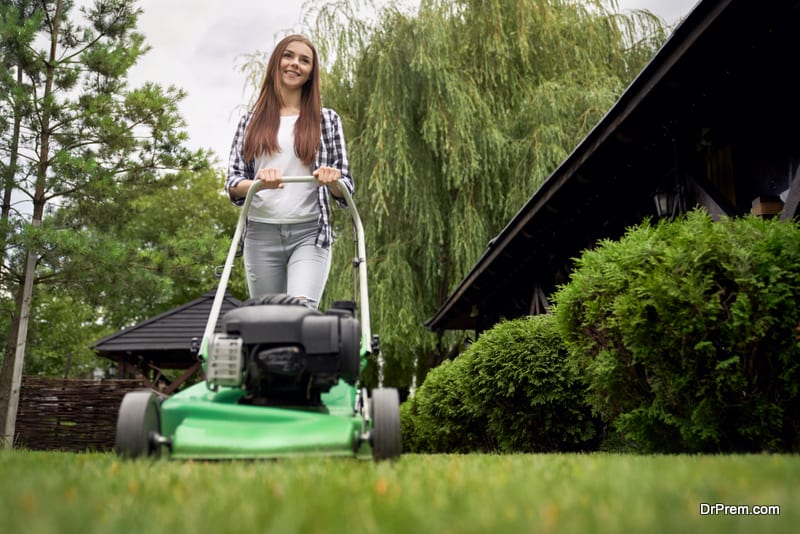A lot of us love to have gardens in our homes. However, not many of us know that maintaining a garden can actually be detrimental to the environment in more ways than one. From wasting plenty of water for watering the plants to emitting hydrocarbons via gas mowers and leaf blowers, there are plenty of ways in which you are contributing to environmental degradation without even knowing about it. So if you want to shift to a greener garden that does not use up too many resources or emits toxic gases, and still manages to look absolutely beautiful at the end of the day, here are some tips that would help you with that.
Start with Composting
Your first step to achieve a green garden would be to create your own composting pit. In addition to being an effortless and fun activity, composting will ensure that the soil in your garden gets plenty of nutrients the natural way instead of relying on artificial fertilizers for the same.
Leave Behind Grass Clippings
Image Source : Diy.RepairClinic.Com
As much as you will be tempted to clear out the grass from your garden, we recommend leaving behind the grass clippings. They help absorb more moisture and decompose to form nitrogen which can nourish the soil.
Opt for Organic Fertilizers
Image Source : SmilingGardener.Com
If you prefer fertilizers anyway, opt for the organic ones. Organic fertilizers decompose better than artificial ones, and release nutrients into the soil gradually. This ensures that the soil in your garden gets proper nourishment for an extended time. In addition to this, you will be doing your plants a favour by keeping them safe from the harmful toxins usually found in synthetic fertilizers.
Plant a Diverse Variety of Plants
In addition to ending up with a garden that looks bright and colorful, this tip will keep away pests from your garden. It is a known fact that the pests of one plant usually feed on the pests of the other. So planting a diverse range of plants in the garden would help attract more predators to these pests that can otherwise destroy the garden. This will also reduce your dependency on toxic pesticides for the same purpose.
Grow your own Fruits and Vegetables
Set aside a space in your garden for fruits and vegetables. By growing your own food, you can reduce the carbon footprint as well the costs related to driving to a grocery store to buy fruits and vegetables. Also make it a point to choose plants that are native to your area as they would require less amounts of water to grow.
Use Water Wisely
An eco-friendly way to save water in your garden is to water your plants either early in the morning or after the sun sets in the evening. These are the times your plants will retain more water, thus preventing the need for you to water them frequently. Also, use a drip hose to get water to the roots so that the rest of the plant can survive with less water.
It also pays to invest in a rainwater harvesting system in your garden. Simply placing a container below the roof’s drainage system to collect the runoff would work. You can then reuse this water to water your plants, cutting down on your water usage costs in the process.
Skip the Gas Powered Mower and Leaf Blower
Image Source : GardenMachinesLtd.Co.Uk
While a gas powered mower and leaf blower can keep your garden neat, they would emit dangerous levels of hydrocarbons in the air. So skip them for electric or manual alternatives. While an electric mower can do an efficient job of cutting the grass, a rake can help you gather up leaves, mulch, compost and other yard leftovers.
Recycle used Containers
Why opt for new flowering pots and containers when you can repurpose the old ones in your home? Everyday packaging materials, including wooden and plastic containers make great pots for your plants. You can use smaller containers as seed starters and place them indoors to get the green vibe into your home as well. So take a good look around your house for any unused item that can double as a plant container before heading out to buy a new one.
Gardening can definitely be an eco-friendly affair. From reusing water from the bathroom to water the plants, recycling old containers as flowerpots and choosing organic fertilizers to composting, these are some of the ways you can turn your garden into a green haven.



